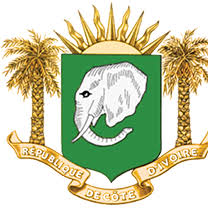The Ministry of Agriculture and Rural Development of Côte d’Ivoire plays a crucial role in promoting agriculture and supporting rural development. Its main mission is to ensure food security and enhance the competitiveness of agricultural sectors, while contributing to the country’s economic growth and the well-being of rural populations.
1. Organizational Structure
The Ministry of Agriculture and Rural Development is governed by a decree on organization, which defines its operations and role. This decree regulates the activities and responsibilities of the different structures within the ministry. It includes:
- The Minister’s Cabinet: Responsible for managing the political and administrative affairs of the ministry.
- The Code of Ethics and Conduct: Strict rules govern the behavior of ministry staff to ensure transparency, integrity, and efficiency in carrying out their tasks.
2. Subsidiary Structures
The Ministry of Agriculture oversees several subsidiary institutions that actively participate in the organization, development, and management of various agricultural sectors. These structures include:
- The Council of Rubber and Palm Oil: Oversees the rubber and palm oil sectors, which are key agricultural products for the economy.
- The National Agency for Rural Development Support (ANADER): Assists farmers and rural communities in improving their living conditions and developing sustainable agricultural activities.
- The Coffee-Cocoa Council: Manages the coffee and cocoa sectors, two major export products for Côte d’Ivoire.
- The National Rural Professions Program (PNMR): Aims to improve vocational training and skills in rural areas.
- The Interprofessional Fund for Agricultural Research and Advisory Services (FIRCA): Supports agricultural research and advisory services to farmers.
3. National Agricultural Investment Program (PNIA)
The PNIA is a key strategy for the Ministry of Agriculture. This program aims to transform the agricultural sector into a driver of sustainable growth. It is based on several key areas:
- The Agricultural Revival Policy: Focuses on improving productivity, modernizing agriculture, and strengthening the capacity of producers.
- PNIA Financing: Financial mechanisms have been put in place to support innovation and investment in agricultural infrastructure and mechanization.
- PNIA Projects: Various projects are being implemented to support agricultural production, improve rural infrastructure, and ensure better marketing of agricultural products.
4. The Agricultural Legal Framework
The Ministry is also responsible for implementing laws and regulations to govern agricultural and land activities:
- The Agricultural Orientation Law (LOACI): Defines the main directions of the country’s agricultural policy.
- The Rural Land Law: Regulates land acquisition and management in rural areas, a key aspect for Ivorian farmers.
- The OHADA Uniform Act on Cooperative Societies: Governs the creation and functioning of agricultural cooperatives in West Africa.
5. Reforms and Strategies
The Ministry is involved in several sectoral reforms to improve the competitiveness of agricultural value chains:
- The Reform of the Coffee and Cocoa Sectors: The goal is to modernize these sectors to ensure stable income for producers while improving the quality of the products.
- The Reform of the Cotton and Cashew Sectors: Cotton and cashew are key agricultural products in Côte d’Ivoire, and efforts are being made to improve their production and processing.
6. Regional and Departmental Directorates
To ensure decentralized management and better addressing of local issues, the Ministry has regional and departmental directorates that implement agricultural policies on the ground.
7. The Ministry’s Agenda
The Ministry actively participates in national and international events to promote Ivorian agriculture:
- International Agricultural Show in Paris: Côte d’Ivoire participates to showcase its agricultural products.
- National Days for the Valorization of Agriculture (JNVA): These days highlight the successes and challenges of Ivorian agriculture.
8. The Minister
The Ministry is headed by Mr. KOBENAN Kouassi Adjoumani, Minister of Agriculture and Rural Development. Under his leadership, the Ministry works to modernize agriculture, support farmers, and improve the competitiveness of the sector.
9. International Cooperation
The Ministry maintains cooperative relations with several countries and international institutions to support agricultural reforms and promote investment in the sector. Notable cooperation exists with countries such as South Africa, especially within the framework of the South-South Cooperation Forum.
Conclusion
The Ministry of Agriculture and Rural Development of Côte d’Ivoire plays a central role in structuring the agricultural sector, improving rural living conditions, and promoting Côte d’Ivoire as an agricultural leader in Africa. Through the PNIA, sectoral reforms, and development projects, it strives to modernize agriculture and address the challenges of climate change, food security, and social inclusivity.
- Current Events
- Upcoming Events
- Past Events



